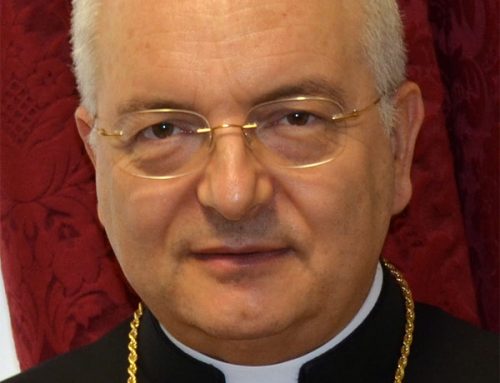For millions of Catholics in Europe, celebrating Sunday Mass in a suitable church building without fear of terrorist attack is something we take for granted. But for Bishop Bruno Ateba, the bishop of the diocese of Maroua-Mokolo, it is the subject of his heartfelt prayer.
After the suicide attacks last July in the town of Maroua, which claimed over thirty lives, people in northern Cameroon are living in fear. The celebration of Sunday Mass is accompanied by major security measures. Only slowly is a sense of normality returning.
During a visit to the international headquarters of the Catholic pastoral charity Aid to the Church in Need (ACN), the 50-year-old bishop explained how he currently celebrates Holy Mass on Sundays, together with around 3000 of the faithful, out in the open air – come rain come sunshine. On each occasion the people form a human chain right around the congregation, and everybody who wants to attend Holy Mass has to first of all go through strict security controls.
Yet despite the fear of terrorism, the Catholic faithful in Maroua have still retained their sense of joy. “We like to sing and dance during Holy Mass”, says Bishop Ateba. This joyful outlook is always present, “For the Lord is our refuge“, he adds.
The suicide bombings in July were terrible. Over 30 people were killed in Maroua on that occasion, while hundreds were injured. The horror was made all the worse by the fact that it appears to have been young girls who were forced by Boko Haram to hide a bomb under their burkas and blow themselves up. “We feel as though it is Good Friday“, says Bishop Ateba, “yet we are not giving up hope.“ He has great confidence in prayer – and in dialogue between Christians and Muslims.
How can the terrorism of Boko Haram be stopped?
For Bishop Ateba the answer is clear: the most important thing is prayer. And the next most important thing is dialogue between Christians and Muslims. The Catholic Church has a good reputation in Cameroon, where 70% of its population of 20 million people are Christians. As Bishop Ateba explains, many Muslims come to the Catholic health centres when they are ill and send their children to the Catholic schools. The bishop has written a prayer for peace, which is read in all the Masses in his diocese, before the final blessing.


